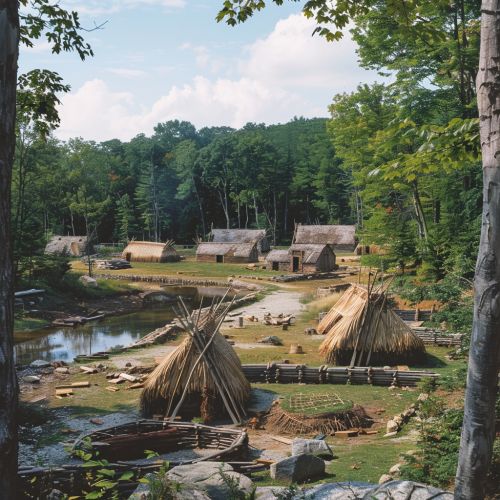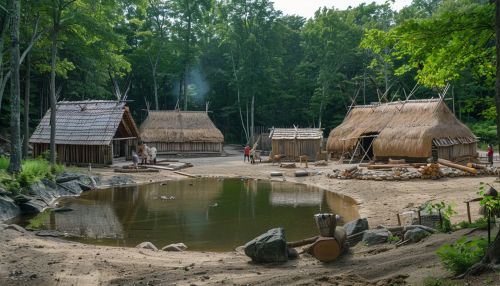History of Massachusetts
Early History
The region now known as Massachusetts was originally inhabited by various Native American tribes, including the Wampanoag, Massachusett, and Nipmuc peoples. These tribes had established complex societies with their own languages, customs, and governance structures long before European settlers arrived. They engaged in agriculture, fishing, and hunting, and had established trade networks across the region.


Colonial Period
Arrival of Europeans
The first European to explore the coast of Massachusetts was likely the Italian explorer Giovanni da Verrazzano in 1524. However, it was the English Pilgrims who established the first permanent settlement at Plymouth in 1620. The Pilgrims were a group of Puritan separatists who sought religious freedom from the Church of England. They arrived on the Mayflower and signed the Mayflower Compact, a document that established a rudimentary form of self-governance.
Massachusetts Bay Colony
In 1630, a larger group of Puritans led by John Winthrop established the Massachusetts Bay Colony. Unlike the Pilgrims, these Puritans did not seek to separate from the Church of England but rather to reform it. The colony quickly grew, and by 1640, it had absorbed the Plymouth Colony and other nearby settlements. The Massachusetts Bay Colony was characterized by a theocratic government where church membership was a prerequisite for voting rights.
17th and 18th Centuries
King Philip's War
One of the most significant conflicts during this period was King Philip's War (1675-1678), named after the Wampanoag leader Metacom, also known as King Philip. The war was a result of escalating tensions between Native Americans and English settlers over land and resources. It was one of the bloodiest conflicts in American history, resulting in the deaths of thousands of Native Americans and colonists.
Salem Witch Trials
In 1692, the town of Salem became infamous for its witch trials. Over 200 people were accused of practicing witchcraft, and 20 were executed. The trials were fueled by a combination of religious fervor, social tensions, and local rivalries. The Salem Witch Trials remain a cautionary tale about the dangers of mass hysteria and scapegoating.
American Revolution
Massachusetts played a crucial role in the American Revolution. The Boston Tea Party of 1773 was a pivotal event, where American colonists, protesting against British taxation, dumped an entire shipment of tea into Boston Harbor. This act of defiance led to the Intolerable Acts and eventually the outbreak of the Revolutionary War. The first battles of the war, the Battles of Lexington and Concord, took place in Massachusetts in 1775.
19th Century
Industrial Revolution
Massachusetts was at the forefront of the Industrial Revolution in the United States. The city of Lowell became a model for industrial cities, with its numerous textile mills powered by the Merrimack River. The state's economy shifted from agriculture to manufacturing, attracting a large influx of immigrants, particularly from Ireland and Italy.
Abolitionist Movement
Massachusetts was also a center of the abolitionist movement. Prominent figures such as William Lloyd Garrison and Frederick Douglass campaigned vigorously against slavery. The state was a key stop on the Underground Railroad, helping enslaved people escape to freedom.
Education and Innovation
The 19th century also saw Massachusetts become a leader in education and innovation. The establishment of Harvard University and the Massachusetts Institute of Technology (MIT) cemented the state's reputation as a hub of intellectual activity. Public education reforms led by Horace Mann set the standard for the nation.
20th Century
Progressive Era
During the Progressive Era, Massachusetts implemented numerous social and political reforms. The state was a leader in the women's suffrage movement, with activists like Susan B. Anthony advocating for voting rights. Labor reforms improved working conditions, and the state enacted some of the first child labor laws in the country.
Great Depression and World War II
The Great Depression of the 1930s had a profound impact on Massachusetts, leading to widespread unemployment and economic hardship. However, the state's economy rebounded during World War II, as its industries played a crucial role in the war effort. The post-war period saw significant economic growth and suburbanization.
Civil Rights Movement
Massachusetts was also active in the Civil Rights Movement of the 1960s. The state passed some of the earliest civil rights legislation, and Boston was a focal point for desegregation efforts, particularly in its public schools.
Modern Era
Technological Advancements
In the late 20th and early 21st centuries, Massachusetts became a leader in technology and innovation. The Route 128 corridor, often referred to as "America's Technology Highway," became a hub for high-tech companies and startups. The state's universities continued to drive research and development in fields such as biotechnology, information technology, and renewable energy.
Political Landscape
Massachusetts has been known for its progressive political landscape. The state has produced several influential political figures, including Presidents John F. Kennedy and John Adams, as well as Senators Edward Kennedy and Elizabeth Warren. The state has been a pioneer in healthcare reform, enacting legislation that served as a model for the Affordable Care Act.
